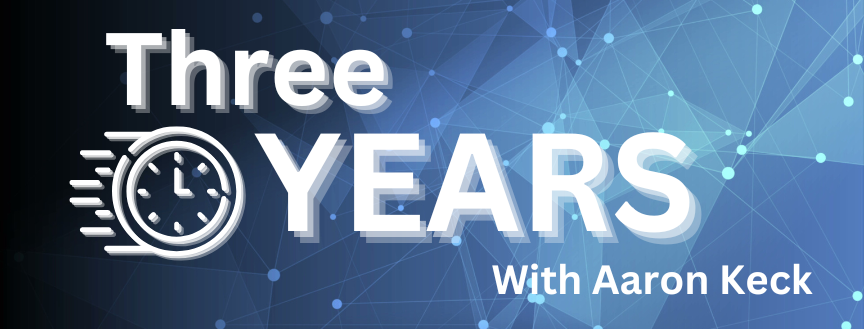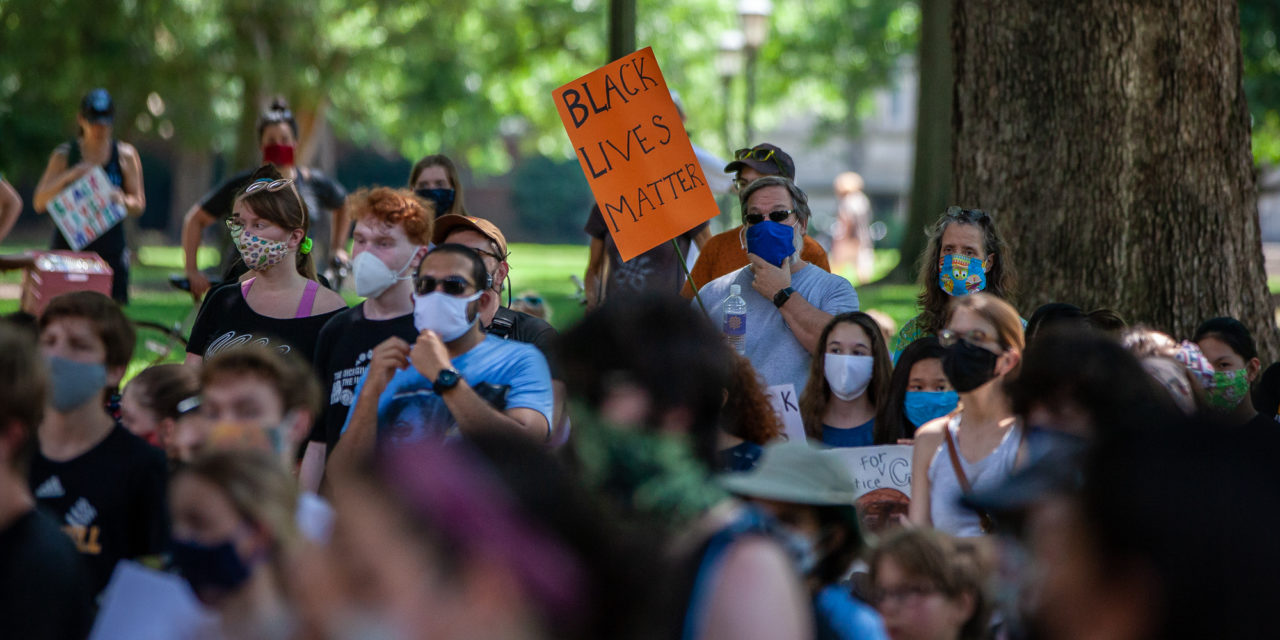In the spring of 2020, everything changed.
Everything changed first over COVID-19. People worked from home, others lost their jobs. Overnight, our plans changed. Our needs changed. And the organizations we counted on to meet those needs – they had to change as well.
And something else was happening too. The same week North Carolina closed its schools, a woman named Breonna Taylor was shot and killed by police in Louisville. Two months later, George Floyd was killed in Minneapolis. And as people flooded the streets in protest, once again, we realized things had to change.
It’s now been three years since that spring. What have we learned from our experience? What lessons have we taken away? What changes have we made? And which of those changes will last?
“Three Years” is a series by 97.9 The Hill’s Aaron Keck – looking back on our memories and lessons learned from our collective experience, drawn from conversations with numerous government officials, nonprofit heads, scholars and thought leaders in the Chapel Hill-Carrboro community.
Click here for the entire 15-part series.

Listen to Chapter 5:
Chapter 5: The Murder
“In the first six months of the pandemic, a lot of the anxiety that everyone was feeling was also bleeding into a lot of other non-pandemic issues.”
I’m speaking with Carrboro Mayor Damon Seils, who was a Town Council member that spring.
“And I think that’s continued. I think the way we relate to each other has changed. There’s a higher level of anxiety in general. In that first six months, for example, I feel like conversations about all kinds of issues in local government were taking on a heightened sense of just – urgency and desperation, almost.”
“Any examples?” I ask.
“Well, I’m thinking especially after the murder of George Floyd…”
We forget. We forget, because it all happened so fast, that it all happened at the same time.
March 10: Governor Roy Cooper declares a state of emergency. March 11: UNC and Duke cancel in-person classes. March 12: the ACC basketball tournament is shut down. March 14: Governor Cooper issues an order closing schools.
And in between – March 13 – that was the night Breonna Taylor died.
The reaction, the protests didn’t come then. COVID was too big, too new – and there was no video to react to. But by May, we’d lived with COVID for two months. The immediacy had died down. All of us were on edge.
And then on May 25, it happened again, to George Floyd in Minneapolis. And this time, we watched it happen.
“I just remember feeling like I was drowning in grief,” says state poet laureate Jaki Shelton Green.
And she wasn’t alone.
“That was hard. It was hard,” says Orange County Health Director Quintana Stewart. “It was a lot to have to just take in, and – I remember going home one evening and just thinking, can I just catch a break? Like, can I catch a break?”
State Rep. Renee Price is the daughter of a police officer – in fact her father was the first-ever Black officer in Rochester, New York – and a longtime fighter for racial justice. “I have so many memories of different incidents over the years,” she says,
and, you know, it was like, Again. We’re doing this again. We’d already had Trayvon Martin, and so many others. And here it is again.
And it’s just – I don’t even know how to describe my feeling. It’s like, When is it going to stop? When are you going to stop seeing Black people like me as criminals just because (our) skin is black? And realize that we’re human beings? You know, you think you’ve made progress over the years because – here I am in the South, a Black woman, and I’m an elected official, and I can walk the streets, and I don’t have to step off the sidewalk, or anything like that. But here we are again. And just because you’re Black, you’re treated differently…
And I remember when I was growing up, seeing those pictures of Bull Connor with the dogs and the fire hoses – and when that was caught on film, and it was seen around the world, it was like the shot heard round the world. People woke up. And here we are again with George Floyd. People saw it, and people woke up again.
That footage of George Floyd’s murder at the hands of a police officer also shook local law enforcement leaders, many of whom had spent their careers working to build trust and achieve equity.
“The images of him dying right in front of you – at the hands of a police officer – it’s heartbreaking for any human being to see it, but particularly for officers who take pride in their work,” says Chris Blue, who was Chapel Hill’s police chief in 2020. “I will never get over seeing that. And being angry. And being in some ways embarrassed, that that happened at the hands of a profession that I love…
“People who do our work, overwhelmingly do it because they love the work and they love people and they love service. And to see that man killed, at the hands of a police officer, was hard for all of the folks who wear a badge – and particularly for our folks in Chapel Hill, who I think take community trust and relationships very, very seriously.”
George Floyd’s murder, and the reckoning it forced us to have with the reality of racial injustice, was a very real psychological burden – almost overwhelming, coming on top of the disruptions, the shutdowns, the anxiety, and the uncertainty that COVID-19 had already brought.
“There were some meetings, (where) we’d be in our Zoom room and in our little squares, and you could just see everyone’s face – and (they were) concerned, deflated, exhausted,” says Jennifer Player of Orange County Habitat for Humanity. “And sometimes we’d just say, ‘All right, we’re just going to cancel this meeting, everybody take a break…
“We just started saying, ‘you know, if it’s two o’clock and you feel like you’re done and you just can’t give anymore, then that’s fine. We’re going to trust you to care for yourself.’”
At the Health Department, Quintana Stewart faced the same situation.
“I really had to figure out how to support my team,” she says, “because I (was) asking them to show up and work some pretty long hours and days, but I needed to create space for them to deal with this other very human experience that we’re all having right now as well…
“And I – I’ll be honest, I don’t know how well I did. But I did acknowledge it. I put it out there and I tried to create a space where they could just share and vent.”
Back in Carrboro, remembering how town government began to respond, Damon Seils finds himself coming back to the same word.
“We were all so raw anyway,” he says, “so you saw people coming to us with a lot of anxiety and urgency, and us responding with a lot of anxiety and urgency. Anxiety is the word that I keep coming back to. Because that’s what this past two years has been, at least for me…
“Constituents (would come) to me, you know, wanting to know what I was going to do about this problem – in a way that was much more direct and, I would say, unforgiving of taking it slow. There was just a greater demand for action.”
But even as our anxiety swelled, many of us still found the strength to act, to raise our voices, to take to the streets in protest, and to use our power to try to make change.
And not just when it came to law enforcement.
“If anything, I think it fueled a lot of my team,” says Quintana Stewart, “because we wanted to do what we could to address some of the other injustices that we were seeing. So we really went gangbusters on like some of our COVID work, with the testing and the vaccination and trying to let everyone in our community know, Hey, we see you, we care about you and we’re going to make this accessible to you…
“I think it intensified our mission. We’ve always been intentional (about equity), but I feel like we went the extra mile, the extra steps – and not only here in Orange County, but the state (government) also. Early on, they pivoted really quick: ‘we need equity with this vaccination process. We’ll give you this much vaccine, (and) you have to commit that this percentage will get to your communities of color, your traditionally marginalized communities.’ So yeah, I think it intensified my efforts and our work.”
Click here for the entire 15-part series.
Featured photo: a Black Lives Matter demonstration on campus June 12, 2020. (Photo by Dakota Moyer.)
Chapelboro.com does not charge subscription fees, and you can directly support our efforts in local journalism here. Want more of what you see on Chapelboro? Let us bring free local news and community information to you by signing up for our biweekly newsletter.


